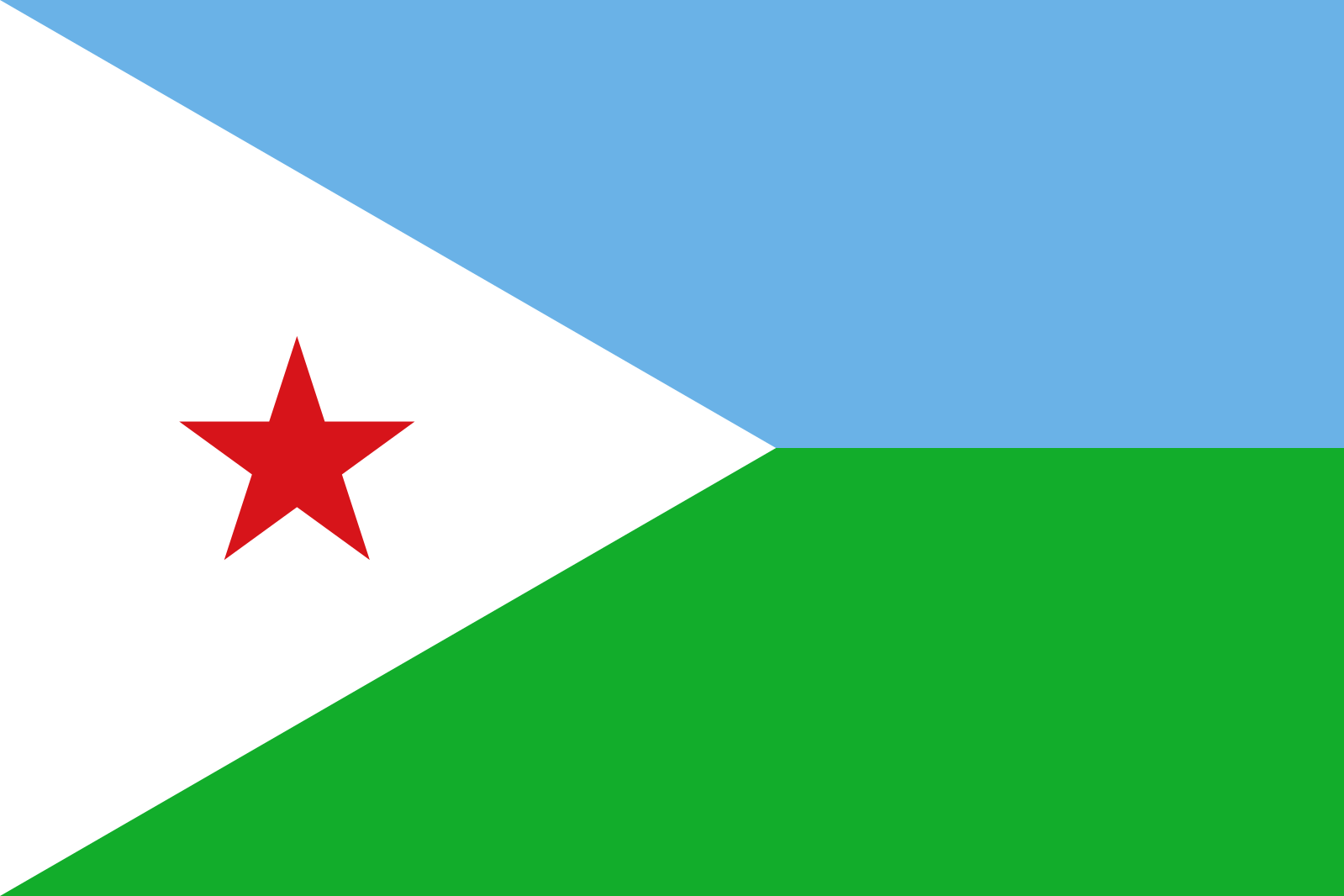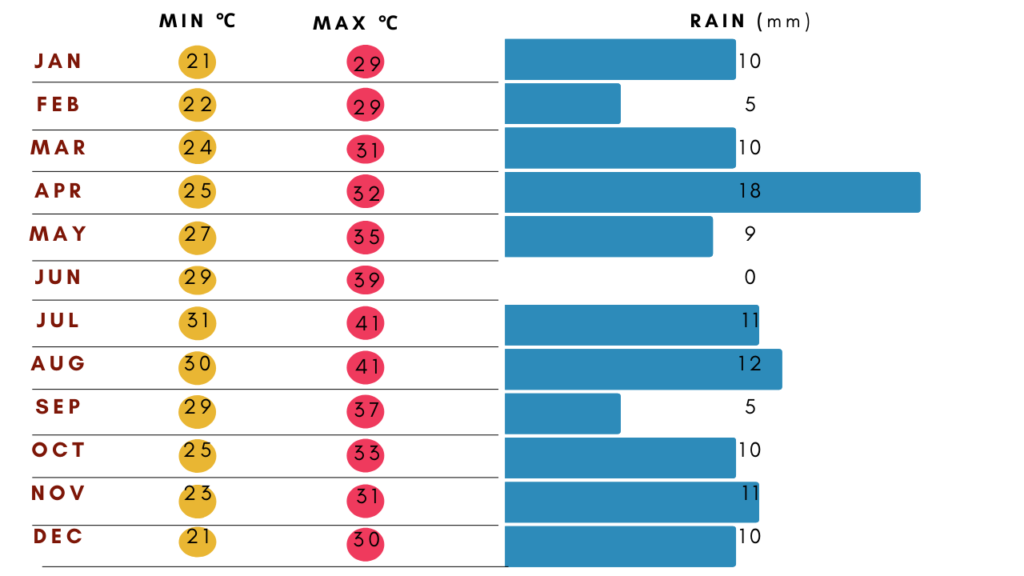
Djibouti is a remarkable small yet beautiful country in The Horn of Africa. Sharing its borders with Somaliland, Ethiopia and Eritrea. It is known for its unique landscapes and underwater world. Located at the Red Sea and Gulf of Aden with 300 kilometres of coastline it has great diving locations. Islands like Maskali and Moucha have beautiful white beaches and tourism facilities. In the mainland you can get to know the traditional Afar Culture. Lake Assal is the lowest point of Africa and is worth a visit. For a more dramatical surrounding Lake Abbe is the place to visit. Vulcanic stones, hot springs and flamingos can be found here.
Djibouti has 2 main seasons with average temperature ranging from 26 to 38 Degrees Celsius. The country’s climate is tropical desert on the coast and in the north, while it is semi-desert in the central-southern highlands. The summer starts in June and ends in September. The cooler months are from November till March. The most pleasant time is to travel from November to March.
| Somaliland Seasons | Start date | End date | Rainfall |
| Winter | October | March | Dry / limited rain |
| Summer | June | September | Dry |

Check with your local health caretaker or doctor for other vaccinations. For more information, please see the website of World Health Organisation: https://www.who.int/ith/en/ . A Yellow Fever vaccination certificate is generally not required for Djibouti. However, note that this may change, and authorities can request this depending on the countries that you’ve recently visited. As a precaution bring the certificate if you’ve recently visited areas where there is high potential for yellow fever virus exposure.
Djibouti is a very safe country with many foreigners and expats living in the capital. Serious crime and hostility towards travellers are very rare.
Republic of Djibouti is located in the Horn of Africa. It is bordered by Eritrea in the North, Federal Republic of Ethiopia in the West and South, and Somaliland in the East. It has an area of 23.200 square kilometres. Djibouti has an 300 kilometres coastline with the majority lying along the Red Sea and Gulf of Aden.
The landscape of Djibouti is varied and extreme, ranging from rugged mountains in the north to a series of low desert plains separated by parallel plateaus in the west and south. Its highest peak is Mount Moussa at 2,028 metres. The lowest point, which is also the lowest point in Africa, is Lake Assal, which is 155 metres below sea level.
Supporting local communities: All our tours are aimed to directly benefit the local people and communities. Everything that we use is owned by locals. From the accommodation, restaurants to everything else needed to facilitate the tours.
Social and Responsible Travel: We are proudly members of Responsible Travel since 2017. We help with the preservations of nature and archaeological sites primarily in Somaliland. We must admit this is not easy as Authorities and people in these kinds of countries have other priority such as bringing food on the table. Our responsibility nevertheless remains to do as much as possible and educate the communities.
Welcome to Djibouti: Arrive, Survive, and Thrive in the Hottest Country on Earth – Rachel Pieh Jones (2019)
Birds of the Horn of Africa: Ethiopia, Eritrea, Djibouti, Somalia, and Socotra – Revised and Expanded Edition (Princeton Field Guides, 107) – Nigel Redman (2016)
Djibouti is a very safe country. Locals are used to foreigners as there are many expats living in the country. You can walk safely in the streets by yourself. There is very little crime.
Yes. Djibouti is a female friendly country. The people are used to female travellers and the dress code is less strict than most Muslim countries.
Yes. Visa is required for all foreign visitors. Best way is to apply online for the E-visa. Check for more information our Visa Check Tool to see what the requirements and options are.
This depends on your location. 1) Djibouti can be entered overland from Somaliland Loyaada border and Galafi & Gelille borders with Ethiopia. 2) You can also fly into Djibouti from multiple countries and regions. Always check the latest updates on routes/times on the Airlines websites.
Djibouti is a modern Muslim country. While some locals dress conservatively, others dress more modern. Too revealing dressing is considered inappropriate in public places. In hotels, cafés and restaurants where alcohol is served, dress code is more freely.
Yes. In Djibouti City and other major cities, you can find ATM’s. If you have Master card or Visa card you can withdraw money from the ATM’s. Note that a fee is charged and only a maximum amount can be withdrawn with your credit card. You can exchange USD dollars and other currencies through the money exchangers on the streets.
Wi-Fi is in general available in restaurants and hotels in the major cities. Internet connection is not always good due to the limited competition in the market. For our tours we select accommodation with Wi-Fi.
Yes. Alcohol is widely available in restaurants, hotels, cafés and some supermarkets.
Yes. In general, you can take pictures of walls, buildings, historic places and even local people. However, always ask first or consult with our guides so they can ask politely. Note that taking pictures of military buildings and personnel is strictly forbidden. Djibouti has a large foreign military presence and taking pictures is sensitive.